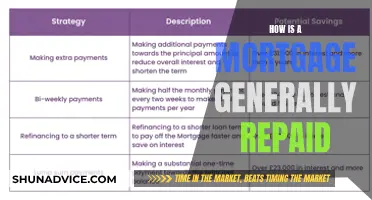
The Department of Land Records in Maryland can record any instrument or legal document that affects someone's legal interest in real property. This includes deeds, mortgages, liens, and powers of attorney. The public can view all instruments related to land transactions recorded in the Circuit Court Land Records Department, and computers are available in the Public Information Room to access these records. Additionally, the Office of the Comptroller of the Currency (OCC) has issued bulletins outlining key data fields that are used to test and validate the accuracy and reliability of home mortgage loan data collected. This is done in accordance with the Home Mortgage Disclosure Act (HMDA), which requires certain financial institutions to collect, record, and report information about their mortgage lending activity.
| Characteristics | Values |
|---|---|
| Who collects mortgage data? | Department of Land Records, Maryland Courts |
| What is collected? | Any "instrument" or legal document that affects someone's legal interest in real property |
| What are common examples of collected data? | Deeds, mortgages, liens, powers of attorney, and certain leases |
| Who can access the data? | The public can view all instruments related to land transactions recorded in the Circuit Court Land Records Department |
| How can the public access the data? | Online through mdlandrec.net or at the courthouse |
| Is there a fee? | Yes, $0.50 per page |
| Is there a process to record a new deed? | Yes, outlined at the People's Law Library; it is recommended to speak to a Maryland lawyer before preparing any documents |
| What is the process if a person listed on a deed has died? | There is a legal process called estate administration to distribute the property, which can be opened at the Register of Wills in the county where the deceased person lived |
| Are there any taxes or fees associated with recording deeds? | Yes, there are state and county transfer taxes, recordation taxes, and other fees that vary by county |
What You'll Learn

Land Records Department
The Department of Land Records in Maryland can record any "instrument" or legal document that affects someone's legal interest in real property. This includes deeds, mortgages, liens, powers of attorney, and certain leases. Each county in Maryland has a Department of Land Records located in the County's Circuit Court Clerk's Office.
The clerks at the Department of Land Records are responsible for accepting documents that meet the requirements for inclusion in land records, rejecting those that do not, and keeping records. They may also collect certain payments at the time documents are submitted. In many counties, clerks cannot accept a document until the county's finance or treasurer's office endorses the document and collects taxes.
Deeds are public information, meaning anyone can view and obtain a copy of a deed. They can be viewed for free online through mdlandrec.net, although users must create an account with the Maryland State Archives to do so. Many courthouses also have computer terminals that can be used to search or review deeds. If someone has a deed reference number, or needs help finding a deed, a clerk in the Department of Land Records can assist them. Copies of documents cost $0.50 per page.
The Land Records Department acts as a custodian for the recording and maintenance of all public records connected to real estate in Howard County. Documents can be viewed and copied in the Public Information Room in the Circuit Court Land Records Department. Documents are also available online through MDLandrec.net, where they can be searched by name, liber/folio, or tax account number.
The Intricacies of Securing a Mortgage: What You Need to Know
You may want to see also

Mortgage data collection process
The Department of Land Records in Maryland is responsible for recording any "instrument" or legal document that affects someone's legal interest in real property. This includes deeds, mortgages, liens, powers of attorney, and certain leases. The process of recording these documents typically involves the following steps:
- Preparation: The first step is to prepare the relevant documents, such as deeds, mortgages, or leases. This process can be complex, as small mistakes can have significant consequences and be challenging to rectify. It is recommended to consult a Maryland lawyer before finalizing any documents.
- Submission: Once the documents are prepared, they are submitted to the Department of Land Records. Clerks in this department are responsible for accepting or rejecting documents based on specific requirements. The clerks may also collect certain payments, such as fees and taxes, at the time of submission.
- Endorsement and Tax Collection: In many counties, the clerks cannot accept documents into the land records until the county's finance or treasurer's office endorses them and collects any applicable taxes. This step ensures that all necessary taxes, such as transfer taxes and recordation taxes, are paid before the documents are officially recorded.
- Recording and Indexing: After the documents are submitted and all necessary endorsements and taxes are in place, the Recording Clerk will officially record the documents. This involves calculating any remaining fees and taxes, stamping the document with the date and time of filing, and assigning a unique liber (book) and folio (page) number.
- Digitization and Retrieval: The Land Records Imaging Department then creates digital images of all instruments related to land transactions. These digital images are indexed, verified for accuracy, and uploaded to MDLandRec.net, a digital image retrieval system for land records in Maryland.
- Public Access: Once the documents are recorded and digitized, they become accessible to the public. Anyone can view and obtain copies of these records through MDLandRec.net or by visiting the Circuit Court Land Records Department in person.
It is important to note that specific procedures and requirements may vary across different counties in Maryland. For example, certain types of deeds and transfers may need to go through the Maryland Department of Assessments and Taxation. Additionally, there may be county-specific taxes and procedures, as seen with Washington County's agricultural land transfer tax and recordation tax.
Pension Mortgages: Repayment Strategies and Options
You may want to see also

Tax implications
The Department of Land Records in Maryland can record any "instrument" or legal document that affects someone's legal interest in real property. Common documents recorded in land records include deeds, mortgages, liens, powers of attorney, and certain leases. These documents often have associated taxes that must be paid for their recording.
In Maryland, there are three separate potential taxes to be paid in order to record a deed: transfer and recordation taxes. Transfer and recordation tax rates vary by county, with a uniform state transfer tax rate of 0.5% of the purchase price across the state. There is an exemption for first-time Maryland homebuyers, where the state transfer tax rate is 0.25%. The county/city transfer tax, on the other hand, varies by county and is based on the purchase price. This tax applies only to deeds and, in certain circumstances, to mortgages in Prince George's County.
Recordation tax can also be due on a mortgage/deed of trust. In a purchase situation, the tax is computed as the tax rate times the loan amount. There is a purchase money exemption if the deed is already being taxed on the same funds, so double taxation is avoided. In a refinance situation, there is a similar exemption up to the amount of money being paid off, so taxes are only paid on any new funds advanced.
In the case of an existing home resale, it is customary for the contract to provide for the transfer and recordation taxes to be split evenly between the buyer and seller. On the other hand, when purchasing a new home from a builder, it is customary (but not required) for the buyer to pay all the transfer and recordation taxes, subject to the "First Time Maryland Homebuyers" exemption. If the buyer qualifies as a first-time homebuyer, half of the state transfer tax is exempt, with the other half paid by the seller.
Additionally, all deeds with agricultural use and partial transfers must go through the Maryland Department of Assessments and Taxation. Any changes in ownership must be accompanied by a completed Intake Sheet, a copy of the deed, and an affidavit of residency and/or a Maryland Form MW 506 NRS for non-resident sales of property.
Mortgage Pre-Approval: Essential Step for Home Loan Success
You may want to see also

Online access to mortgage data
The public can access mortgage data online through the Maryland Courts website. The Land Records Department acts as a custodian for the recording and maintenance of all public records connected to real estate in Washington County. The public can view all instruments related to land transactions recorded in the Circuit Court Land Records Department. All instruments are available online and can be accessed through computers in the Public Information Room.
To access these records, users must first register for an account with the Maryland State Archives. Once logged in, users can search for land records by name, liber/folio, or tax account number. They also have the option to print these records. The Maryland Courts website also provides contact information for the Records Department, which can be reached by calling 301-790-7413 Ext. 4.
In addition to the online portal, many courthouses also have computer terminals available for the public to search and review deeds. If an individual has a deed reference number or needs assistance finding a deed, a clerk in the Department of Land Records can provide support. The Department of Land Records can record any "instrument" or legal document that affects someone's legal interest in real property, including deeds, mortgages, liens, powers of attorney, and certain leases.
It is important to note that deeds and other land records may be subject to certain taxes and fees. For example, Washington County imposes a Recordation Tax of $3.80 per $500.00 or fractional part of the consideration. Additionally, there may be State and County Agricultural Land Transfer Taxes applicable for certain transactions. These taxes are collected by the Washington County Treasurer's Office prior to recording with the Clerk of the Circuit Court.
Mortgage Reserves: Critical for Home Loan Approval and Peace
You may want to see also

Legal documents
In Maryland, the Department of Land Records is responsible for recording any "instrument" or legal document that affects someone's legal interest in real property. This includes deeds, mortgages, liens, powers of attorney, and certain leases. These documents are available to the public, and anyone can view and obtain a copy of a deed or other instrument.
Deeds are written documents that transfer ownership rights to a piece of land from one person (the grantor) to another (the grantee). In Maryland, deeds must be recorded with the local government, typically the county clerk's office or the Department of Land Records. The process of recording a deed can vary by county, but generally involves submitting the deed and any required supporting documents to the appropriate office.
In addition to deeds, the Department of Land Records also handles other legal documents related to real property, such as mortgages, liens, and powers of attorney. Mortgages, for example, are recorded to create a public record of the loan and the property that serves as collateral. Liens, on the other hand, are recorded when there are unpaid taxes or other debts associated with the property. These legal documents can affect the ownership and use of the property, and it is important for them to be properly recorded and maintained.
To record a legal document related to real property in Maryland, individuals typically need to submit the document to the appropriate county clerk's office or the Department of Land Records. In some cases, the document may also need to be endorsed by the county's finance or treasurer's office before it can be accepted. There may be fees and taxes associated with recording these documents, and it is important to ensure that the document meets all the necessary requirements to avoid any issues or delays in the recording process.
FICO Scores: Getting Mortgage-Ready
You may want to see also
Frequently asked questions
The public can access all instruments related to land transactions, including mortgages, through the Circuit Court Land Records Department. These records are available online via MDLandrec.net.
To collect mortgage data, you will need to know the name of the owner, which can be found by searching for the owner's name on Maryland Case Search.
The first step is to prepare a deed, which can be complicated and may require the help of a lawyer. Once the deed is prepared, it must be recorded with the Department of Land Records.
There are several taxes and fees associated with recording a deed, including state and county transfer taxes, recordation tax, and a $40 surcharge on recordable instruments.
A grantor is a person who gives their ownership rights to a piece of land, while a grantee is a person who receives those ownership rights.







